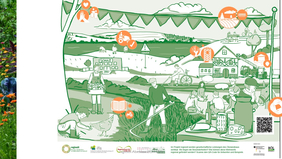The regiosöl research project funded by the German Federal Organic Farming Program (BÖL) comes to a close at the end of April. Over a period of three years, the Institute for Rural Structural Research (IfLS e.V.) together with Zentrum für Ökologische Landwirtschaft e.V. . and the Regionalwert AG Rheinland, with the cooperation of Regionalwert Leistungen GmbH, have been researching approaches for recording the benefits and their effects at regional level. The approaches developed were tested at the level of the pilot regions Rhineland (administrative district Cologne-Bonn) and Northern Hesse (administrative districts Kassel, Werra-Meißner and City of Kassel) on 61 farms and in a real-lab exchange with experts.
At the digital final event on 29 March, the project results of the company survey and the possibilities of deriving statements for the regional level from the method were presented and further questions on the practical implementation of the findings were discussed. Among the 35 participants were employees of the Federal Ministry of Food and Agriculture (BMEL) and the Federal Office for Food and Agriculture (BLE), representatives of the agricultural authorities of the federal states as well as practitioners in the agricultural value chain, researchers and networkers. The presentations of the final event are published at www.ifls.de/referenzen/regiosoel/materialien-ergebnisse/.
Dr. Karl Kempkens, Head of the Department of Organic Food Management at the BMEL, began by emphasising the urgent need to develop reliable and justiciable evaluation methods for the performance of organic farming and referred to the prospect of replacing direct payments to agriculture in the CAP from 2027 with an instrument based on climate and environmental performance.
Simone Sterly, Dr Marie Sophie Schmidt and Ribana Bergmann (IfLS) summarised the research project's approach, concepts and communication materials. Johanna Saxler (Regionalwert Leistungen GmbH) presented the results of the operational survey and the resulting adjustments to the regional value performance calculator. Dorle Gothe (Regionalwert AG Rheinland), Silke Flörke and Sabine Marten (Zentrum für Ökologische Landwirtschaft e.V.) summarised the steps that followed the survey and the results on the overall social impact of organic farming at the level of the pilot regions. The current situation in the regions was reviewed on the basis of selected regiosöl criteria from the fields of ecology, social affairs and regional economy in order to identify strengths, weaknesses and strategies for action.
In the course of a workshop phase during the event, further points of contact were created to facilitate the preparation of individual sustainability balances for farm managers. The focus was on making the results usable for customer communication and operational development. Possible forms of support were aimed at direct financial or organisational support for the preparation of the balance sheet as well as raising awareness of the topic among advisory institutions and the public.
In two keynote speeches, young representatives of agricultural practice reported on their own motivation to have a positive impact on society and named important prerequisites for organic farms to receive more recognition for their achievements. Nils Tolle, farm manager and consultant in climate protection and adaptation management, explained a market gardening model in which vegetables are produced on a small area with a lot of manual labour, which, in addition to the positive effects in terms of land use and climate balance, also creates jobs and creates a social event for the recipients when the vegetable boxes are collected. He attributed particular value to the "free space" created by economic and spatial resources, which facilitates experimentation with sustainable business models. Bastian Engemann from BiolandHof Engemann (Organic Farm Emgemann) gave insights into the ambitious concepts and activities of his family business to create a regional value-added centre with processing possibilities for vegetables, among other things, and thus to improve regional value creation. He emphasised that the initial investments in particular were a major hurdle for the family business. Several participants in the discussion saw this as an example of governmental tasks to create the conditions on which organic farming can build to provide further socio-ecological services.
The policy recommendations as well as materials to raise awareness of the manifold social, ecological and regional economic benefits of organic farming will be published at the end of April. Project results and further information are available at: https://www.ifls.de/en/references/regiosoel/
Contact persons at IfLS: Simone Sterly (sterly[at]ifls.de), Ribana Bergmann (bergmann[at]ifls.de)

